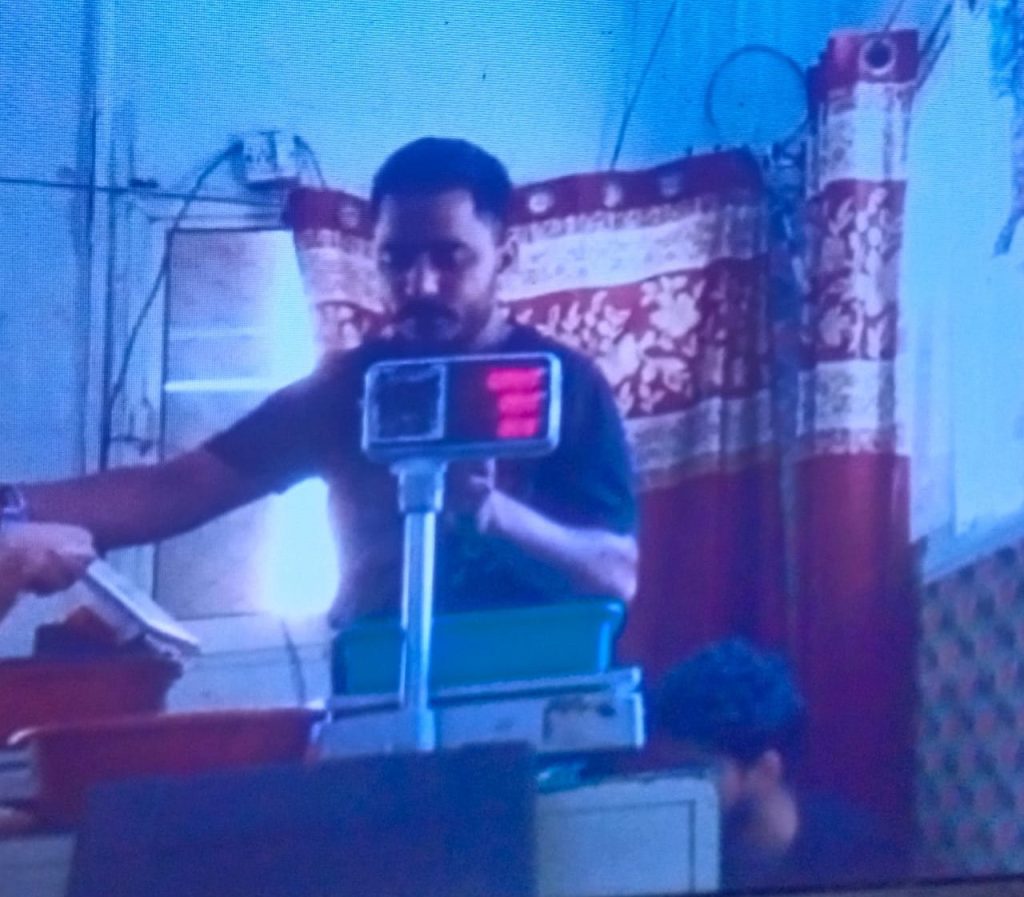Tehelka SIT exposes franchise owners of Delhi-NCR’s renowned retail chain flouting regulations by selling unauthorised and substandard products illegally sourced from outside markets, jeopardizing consumers’ health.

In September 2024, a controversy erupted over the alleged use of adulterated ghee in the preparation of Tirupati Laddu Prasadam. Andhra Pradesh Chief Minister N. Chandrababu Naidu claimed that substandard ingredients, including animal fat, had been used in the prasadam offered to Sri Venkateswara at Tirumala in Tirupati district during the previous state regime headed by former CM Y.S. Jaganmohan Reddy.
While we are through the Diwali season, which brought numerous reports of adulteration from across India, posing a serious health risk to consumers, Tehelka’s investigation uncovers a new facet of the issue—an entrepreneur running franchise retail stores in Delhi-NCR involved in substandard practices. This retail chain, the largest organised network for fruits and vegetables in India, operates 400 outlets in the National Capital Region and 23 in Bengaluru, serving over 1.5 lakh customers daily. It is owned by another brand under the Ministry of Fisheries, Animal Husbandry and Dairying, Government of India.
The store owner has been caught on Tehelka’s camera confessing to selling substandard products at his two stores in Noida without the knowledge of the retail chain’s senior officials. These stores, launched in 1988 to support urban consumers and farmers, are run by ex-servicemen or their dependents through franchise ownership. But today, the owner is betraying this mission by selling substandard products while keeping the retail chain’s officials in the dark.

“Honesty doesn’t pay. To make a profit, one has to resort to dishonesty. I’ve stocked many unauthorised items ferried in from outside markets, and that’s how I’m earning Rs 1.50 lakh a month. If I stick to selling only the company’s items at their prices, I will make nothing. Now, even if the company raids my stores and catches me violating guidelines, they’ll only impose a small fine,” said Sudhir Chaudhary, owner of two retail stores in Noida, while speaking to Tehelka’s under cover reporter.
“We don’t permit unauthorised items, sourced externally, in our stores. We have our own network of farmers in Bengaluru who supply vegetables and fruits. Our franchises are exclusively given to ex-servicemen or their dependents. However, in your case, despite being a civilian, we’re willing to offer you a franchise,” said the Noida supervisor of the retail chain, while speaking to our reporter.
“If you play smart, you can get around the rules and keep unauthorised items brought in from outside in the store. The supervisor only checks the invoices, not the actual items stocked in the store,” said Shiva Chaudhary, Sudhir’s younger brother, on another occasion
These retail stores are supposed to provide fresh products sourced directly from farmers, with competitive daily rates based on seasonal availability. They uphold strict food safety standards, accurate weighing, fixed prices, and a comprehensive product range all under one roof. With daily delivery schedules [365 days, 24×7], each customer receives a printed bill for purchases. The stores strictly prohibit the sale of unauthorised items, focusing exclusively on fresh fruits, vegetables, and value-added products.

However, franchise owners like Sudhir Chaudhary flagrantly violate these guidelines as sub-standard fruits, vegetables, and other products are sold at his two franchise stores in Noida. Our reporter, posing with a fictitious proposal to secure a franchise for another outlet through him, met Sudhir at his Noida store. Sudhir explained to the reporter that to make a good profit, one must resort to dishonesty, as there’s no profit in following the rules.
Reporter– Imaandari se kaam karenge to kitna kama lenge?
Sudhir- Imaandaari se kuch bhi na kama paogey, aur kisi bhi kaam mein na.
Sudhir (continues) – Imaandari ka zamana gaya.
Reporter- To percentage itna kam de rahi hai XXXX…9 %. ?
Sudhir- Jab tum agree ho jaogey to badha bhi saktey hain, kaiyon ka badha diya hai…. hamara 12% kar diya hai.
[This excerpt from our reporter’s conversation with Sudhir Chaudhary reveals how in the world of food adulteration, ethical choices often clash with the harsh realities of profit. As financial pressures mount, the temptation to abandon honesty becomes hard to resist. What emerges from this exchange is the erosion of ethical business practices.]
Although this renowned retail network for fruits and vegetables prohibits the sale of unauthorised products—those sourced from general markets instead of the chain’s procurement office—Sudhir candidly confessed on Tehelka‘s camera that he routinely sells such items at his two stores. He disclosed that every night around 2 a.m., he procures fruits and vegetables from an outside mandi at rates lower than the company’s, allowing him to make a substantial profit. From just one store, he currently earns Rs 1.50 lakh per month.
Reporter- Kitna kama letey ho aap is wale store se xxxx ke, imaandari se batao?
Sudhir- Is wale se kam se kam 1.5 lakh.
Reporter- 1.5 lakh mahina?
Sudhir- Sab kharche warche kaat ke!
Reporter- Bura nahi hai.. par usmein bahar ka samaan le rahe ho aap?
Sudhir- 2 baje samaan lata hoon, 2 baje jaata hoon mandi.
Reporter- Tum phir wahan se?
Sudhir- Wo khadi meri Eco (vehicle)…white wali.
Reporter- Jismein…jismein us din agarbatti laga rahe they.?
Sudhir- Ji.. usmein maal aata hai..
Sudir (continues) – Jo tumhein company ki gobhi 1 kilo hai, aaj Rs 39/kilo gobhi hai.
Reporter- Company ka rate?
Sudhir- Jo hum pay karenge company ko… Rs 35 per kg hai.
Reporter- 4 rupees tumhara ho gaye.?
Sudhir- Hum chale gaye mandi, wahan se Rs 20 kilo ke hisab se le aaye.
Reporter- Aur sasti le li..
Sudhir- Wahan se Rs 20 per kg le li..aur yahan Rs 39 kg mein bech di, kitne rupees bach gaye Rs 19.
Sudhir (continues) – Hamara jo samaan bik raha hai, hamari 2 crate bik rahi hai ek company ka maal, ek yahan ka maal.
[From the above exchange, we learn that Sudhir exploits the system by selling unauthorised goods that offer higher margins. He admits to knowingly violating the company’s rules, as long as he can evade detection.]
Now, Sudhir, a franchise owner, openly admitted that his stores are stocked with numerous unauthorized items for sale, a clear violation of the retail network’s strict guidelines. Despite the network’s policy of sourcing only authorised products, Sudhir disclosed that he procures goods from external suppliers to increase his profit margins. He even confessed to regularly bypassing company supplies, stating that after initially purchasing from the company, he turns to outside vendors for cheaper alternatives. The lure of higher profits, it seems, outweighs any obligation to follow the rules.
Reporter- To abhi kya kya samaan aapke store par bahar ka hai..?
Sudhir- Is bar ek to seb (apple) bahar ke hain, baingan, gobhi hai. Torai aadhi company ki hai aur aadhi bahar ki hai.
Reporter- Matlab 4-5 items bahar ke hain..?
Sudhir- 4-5 nahi.. bahut item bahar ke hain.
Reporter- Kitne item?
Sudhir- Bahut item hai.
Reporter- Coffee etc bhi bahar ki hai?
Sudhir- Coffee hamne ek baar company se mangwa li..uske baad hum bahar se latey hain.
[What we learn from this conversation is that Sudhir has no hesitation in flouting store policies, as he finds it more profitable to rely on external sources. The pattern is clear: dishonesty thrives when profit becomes the priority.]
When we asked Sudhir if he could provide us with the contacts of outside distributors supplying items to his stores, given that we were considering taking a store in Noida through him, he readily agreed. Not only did he offer to share the distributor details, but he also revealed how to discreetly sell banned items like pan masala and cigarettes, in violation of the retail network’s policies. Sudhir made it clear that while such activities are risky, they can be profitable if handled with caution.
Reporter- To bhai ek kaam karo maan lo hum 128 wala le letey hain, to hamare liye bhi bahar ka mangwa dena phir.
Sudhir- Hum aapko distributor ke number de denge.
Reporter- Log pan masala , cigarette rakhtey hain?
Sudhir- Wo kaam agar tum chup kar ke kar saktey ho to kar lo..ab by chance customer hai wo betha hai, tum cigarette de rahe ho, kal kisi customer ke saamne maang liya, bhaiya cigarette de do, ab tum kahogey hum nahi bechtey, wo kahega kal to mein le kar gaya , to wo us cheez ko catch kar letey hain.
Reporter- Us kaam mein kya karna padega..?
Sudhir- Kuch nahi…jo mein bata raha hoon.
Reporter- Aap 1.5 lakh kama rahe ho lekin sara samaan bahar ka?
Reporter (continues) – Sudhir bhai tum jab bahar ka samaan latey ho to hamara bhi la dena.
Sudhir- Dekho mein Rs 20 ki coffee laya… tumhe Rs 25 mein bech raha hoon, to jo kaam tum khud kar saktey koi aur nahi kar sakta.
Reporter- To tum hame distributor ke number de dena.
[It emerges that Sudhir is not only willing to violate company rules but is eager to guide others on how to do the same for personal gain. Here, profit takes precedence over principles, finding ways to bend the rules time and again.]
According to Sudhir, honesty is a thing of the past; dishonesty, he insists, is essential for profit. He explained to our reporter how he procures unauthorised items for his store, despite it being against company’s policy. Additionally, he revealed the commission he receives from the retail network on the sale of products. Sudhir hinted that by building a relationship with the company, the percentage of commission could even increase, as it had for him.

Sudhir- Tum subah uthkar Bhangel chale jao, gadi to hogi na tumhare pass.?
Reporter- Haan.
Sudhir- Bhai subah 5 baje supply aa rahi hai, wahan se uthakar 5-5 kilo la kar yahan mix kar do.
Reporter– Imaandari se kaam karenge to kitna kama lenge?
Sudhir- Imaandari se kuch bhi na kama paogey, aur kisi bhi kaam mein na….imaandari ka zamana gaya
Reporter- To percentage kitna kam de rahi hai XXXX….9 %. ?
Sudhir- Jab tum agree ho jaogey to badha bhi saktey hain, kaiyo ka badha diya hai, hamara ka 12 % kar diya hai.
[Sudhir sees dishonesty as a necessary strategy for success. He believes that honesty leads to no gain, and bending the rules is the only path to profit. The erosion of ethics in pursuit of financial rewards is stark.]
The retail network regularly sends supervisors to inspect the items in the stores, ensuring compliance with their guidelines and preventing unauthorised outside products. However, Sudhir revealed that his brother had gone as far as threatening the supervisor to ensure he kept quiet about the unauthorised goods being sold. It seems that fear, coupled with occasional appeasement, is their chosen strategy to keep things under control and safeguard their profits.
Reporter- Accha isko set kaise kare… supervisor XXXX ko ?
Sudhir- Set to sab ho jayega, papi pet ka sawaal hai, tum kuch khane ko dogey to hoga, abhi ye company ke gun ga raha hai, kal tumhare gayega, magar tootna mushkil se hai.
Reporter- Aapne kaise set kiya XXXX ko ?
Sudhir- Hamne dhamka kar set kiya hai.
Reporter- Dhamka kar kaise ?
Sudhir- Chote bhai ne bahar pakad liya tha isko, khoob baat sunai thi isko, ek to issey ye baat ki ke jitna maal mangwaonga utna maal aana chahiye, agar tumhara company se agreement sign hai, to company se agreement hamara bhi sign karwao. Aur jo hum maal mangwayenge, wo hi maal aayega. Company apni taraf se kuch nahi bhejegi, 1-2 crate to hum bhi jhel lenge, par itna nahi ke 4-5 crate bhej do…kuch bhi maal bhej do.

[From this exchange, we learn that intimidation is sometimes employed by franchisees to influence company-appointed supervisors. In this case, Sudhir’s brother has resorted to threats to ensure the supervisor remains silent. Thus, profit here is derived not from compliance but from coercion.]
Sudhir openly admitted that he stocks outside items at both of his Noida stores, in direct violation of the retail network’s policies. The company enforces stringent rules to maintain a vegetarian-only product range, but Sudhir flouts these regulations by selling unauthorised products for higher margins. He not only sells prohibited goods but has also devised ways to work around the system, including selling items like eggs and specific kinds of flour that are not allowed. His disregard for the rules stems from a desire to maximise profit, regardless of ethical considerations.
Reporter- To aap jo bahar ka samaan latey ho…wo 93 wali store ke liye bhi latey ho ?
Sudhir- Haan ji..
Reporter- Kuch aisa item rakh saktey hain jo allowed nahi hai yahan ?
Sudhir- Haan bahut se item hain, andey nahi bech saktey yahan.
Reporter- Company ki taraf se allowed nahi hai ?
Sudhir- Vegetarian hain yahan. Aap nahi bech saktey…aap side mein bech lo magar ander nahi bech sakte.
Reporter- Aap kya bech rahe ho jo allowed nahi hai ?
Sudhir- Gold ke rusk bech raha hoon, bahar ke bech raha hoon jo allowed nahi hai. Bahar jo fan, rusk rakhe hain inmein bahut margin hai.
Reporter- Ye isko pata hai ?
Sudhir- Haan ye isko pata hai.. usko kehna hai ander tum hamara maal bechogey bahar tum kuch bhi becho.
Reporter- Wo jo tum kuttu aata bechtey ho?
Sudhir- Wo hum sab bahar se latey hain.
Reporter- Kuttu aata allowed nahi hai
Sudhir- Nahi.
Sudhir (continues) – Agar aap checking par aa jao, aap ne dekh liya ye kya cheez hai, bhai hamne bahar rakh rakha hai.
Reporter- Bahar agar tum 2 item rakh do to koi dikkat nahi hai.
Sudhir- Aadmi chori karega hi, aur har booth wala karta hai.
[It is clear that Sudhir exploits the system by selling unauthorised goods that offer higher margins. He admits to knowingly violating the company’s rules, as long as he can evade detection. The drive for profit here comes at the expense of integrity and transparency.]
Now, Sudhir openly admitted that running a franchise retail outlet involves selling unauthorised items sourced from outside markets. He explained that this practice is widespread among those managing such outlets, with many taking advantage of the higher profit margins these external products offer. To substantiate his claim, Sudhir invited us to visit Delhi’s Gazipur mandi, where numerous vehicles from similar retail outlets can be seen purchasing outside items. According to him, the profit margins are significantly higher in Delhi compared to Noida, making this practice even more prevalent in the capital.
Reporter- Har booth wala bahar ka samaan bech raha hoga warna to profit hi nahi hai ?
Sudhir- Haan tum Gazipur mandi chalna… itni gadi dikhaonga tumhe XXXXX ki.
Reporter- XXXXX ki gadi Gazipur mein ?
Sudhir- Matlab jaise hum chale jaawe, meri gadi hai personal ye hota hai, ab jab tum XXXX mein aa jaogey tumhe pata chal jayega wo is dukaan se lata hai, phir tum retire ho jaogey maano, yahan kam margin milega, Delhi jaogey zyada margin milega sabzi mein.
[Sudhir highlights the widespread practice of selling unauthorised goods in retail outlets, with vehicles from these stores frequently sourcing items from Gazipur mandi. It emerges that profit margin in buying outside items is more in Delhi, than Noida. ]
Then, Sudhir was asked about the potential risks of being caught red-handed while bringing unauthorised items into his store. He confidently dismissed the possibility of such a raid happening, reflecting his belief that the system is either lenient or complicit in turning a blind eye to these practices.
Reporter- Agar tum maal bahar se la rahe ho raat mein.. dukan mein rakh rahe ho.. usi samay kisi ne chaapa maar diya.. ?
Sudhir- Aisa nahi hota.
[It seems that the system’s lax oversight gives Sudhir the assurance that no one will raid or question their operations, making it easy to continue such practices without fear of repercussions.]
Now, Sudhir provided a glimpse into how the system could be manipulated. He advised us a way out: ‘Start pleading and complaining to the supervisor about not making enough profit’. This tactic, he claims, will make the supervisor turn a blind eye and allow the sale of unauthorised outside items in the store. While bribery may not work, Sudhir believes emotional appeals can do the trick.
Reporter- Kitni tankha hogi iski XXXX ki.
Sudhir- Iski hogi 40K.
Reporter- Central govt job hai, ab to retire hone wala hoga ?
Sudhir- Ji, waise ye bahut mushkil time mein khata hai, iske saamne royo bas, jitna ho sakta hai, jab bhi aaye rona shuru kar do: “arey sir ji kahan phasa diya. Sir ji ye na bik raha, wo na bik raha”. Phir wo sochta chalo bechne do bahar ka..kuch to kama le bhai.
Reporter- Accha aisa hai, chai pani pila do jab aaye.
Sudhir- Haan abhi to cold drink pilai.
[Sudhir’s advice on manipulating the supervisor through emotional appeals is interesting. It emerges that playing the victim can lead to bending the rules!]
Sudhir now shared how retailers, even when caught engaging in unauthorised practices, face minimal consequences. He explained that authorities avoid sealing stores because of the financial loss it would cause because of the perishable items kept in the store. Instead, retailers are usually given a warning or asked for a nominal fine, reflecting a system that prioritises preserving stock over enforcing rules. Sudhir’s insight exposes the lenient measures taken in such scenarios, allowing violations to continue with little deterrent.
Reporter- Agar phas gaye to kya hoga zyada se zyada store seal ho jayega.?
Sudhir- Nahi hoga seal.
Reporter- Kya hoga ?
Sudhir- Inka nuksan hai seal karne mein. Utna kilo maal waste hoga.
Reporter- To ye kya kartey hain ?
Sudhir- Kuch nahi..ye warning detey hain, 2000 ka cheque le lenge kabhi kabhar…cancelled cheque. Inka kehna ye hai meri ankhon ke aagey kuch nahi hoga chahe peeche kuch bhi karo.
[Sudhir’s conversation sheds light on how lenient the enforcement is when it comes to breaches in store policies. The upshot is that violators face minimal consequences; often just a warning or a fine of a small amount, highlighting the ineffectiveness of deterrence in this system.]
Now, Sudhir recounted an incident where he deployed one of his employees to watch for a supervisor while they unloaded unauthorised goods for the store. He revealed that by monitoring the supervisor’s arrival time, they were able to move the goods discreetly, avoiding detection. Such actions reflect a calculated approach on the behalf of retailer to circumvent regulations
Sudhir- Ab kabhi- kabhi kya hota hai hamne mangwai nahi supply XXXX se. Mandi se lakar subah hi bhar di sari crate, ab hame pata hai 9.30 se 10 baje tak aa jata hai ye, ek banda bahar beth gaya, ek car mein, gate par beth gaya, wahan se bata diya bhai ye aa gaya, crate gadi mein rakh do, gadi basement mein, aayega dekhega, kuch hai nahi.
Reporter- Roz aata hai ye?
Sudhir- Nahi ek din chod ke ek din.
[Sudhir’s conversation reveals a well-orchestrated system to evade supervision. He says that careful planning allows them to bypass oversight.]
Sudhir candidly discussed the challenges of getting caught for selling unauthorised items at his franchise. He revealed a method of mixing company-supplied goods with outside products, making it difficult for the supervisor to detect any wrongdoing. By ensuring that a minimum quantity is sourced from the company, Sudhir explained, they can bring in additional stock from external suppliers without raising suspicion.
Reporter- Ye pakad to nahi pata samaan ?
Sudhir- Ab Parle Ji ka biscuit kya pakdega. Matlab ek cheez ek haftey mein ek baar company se, do baar bahar se. Mangwana zaroor padega company se.
Reporter- Matlab 10 packet company se mangwaye aur 10 apne rakh diye ?
Sudhir- Haan us mein kaise pakdega. Kuch nahi check karta.
Reporter- Wo ye to check kar sakta hai 10 bheje they 20 kaise reh gaye ?
Sudhir- Bik gaye, bhai haftey mein tumne 2 baar mangwa liye.
[Sudhir’s remarks illustrate a clever system of mixing company goods with outside stock, making detection nearly impossible. It emerges that these tactics have become an accepted norm, allowing retailers to manipulate inventory unnoticed.]
Now, Sudhir sheds light on how stores are typically assigned to ex-servicemen, but he revealed that, in reality, securing one often relies on “jugaad”—an informal, resourceful approach.
Reporter- Accha ye ex armyman ko milta hai store.. humko kaise milega.?
Sudhir- Jugad se jaise milta hai.
Reporter- Wo kar dega jugaad.
[This highlights the lengths to which individuals will go to navigate bureaucracy and gain access to opportunities that should be reserved for veterans.]
After speaking with Sudhir, our reporter met his younger brother, Shiva Chaudhary, who manages one of the Noida stores in his absence. Shiva explained that selling unauthorised items is easy because the inspecting supervisor only checks invoices, not the actual stock. According to Shiva, his store has a daily demand of 30 kg of tomatoes. He orders one crate (10 kg) from the company and sources the remaining two crates externally. To avoid detection, he transfers the tomatoes from crates to polybags before inspections.
A supervisor, responsible for inspecting stores to ensure they sell only company-approved items, told our reporter that these franchises are allocated exclusively to ex-servicemen. However, since some civilians are also performing well, he could consider allotting a store to us. According to him, selling unauthorised items is strictly prohibited, and violations would result in the forfeiture of the store’s security deposit. Managing 25–26 stores in Noida, he claims he can easily identify unauthorised items stocked for sale. He however admitted that some store owners do sell outside items for quick profit.
How does one acquire a franchise of this leading organised retail chain? In response, the supervisor told us that applicants must apply directly to the retail chain. After passing an interview, the applicant is required to pay a security deposit of Rs 2 lakh and maintain Rs 1.50 lakh as working capital in their account. The retail chain then provides 5–10 days of training before handing over the store.
According to the supervisor, the chain provides the store space and manages all infrastructure needs. Product supply is handled by the chain, with fixed pricing for all items sold to customers. Stores are expected to remain open [365 days, 24×7], with the retirement age set at 58. The supervisor mentioned that the chain has third-generation workers among its franchisees and guarantees 200% purity of its products, sourced directly from farmers who supply exclusively to this retail chain.
Providing quality products to consumers is the core mission upon which this renowned retail chain was founded, promising fresh, reliable, and safe produce for households across India. Yet, some franchise owners, driven by the lure of higher profits, are compromising this promise by selling unauthorised and substandard products, potentially endangering consumers’ health over time. In a thorough investigation, Tehelka has brought one such violator to light, exposing the serious breach of trust. It’s now imperative for the retail chain’s officials to step up and take decisive action against these unscrupulous operators, whose actions not only jeopardize consumer safety but also tarnish the brand’s reputation. Consumers, too, must remain vigilant to these hidden risks and demand accountability.













